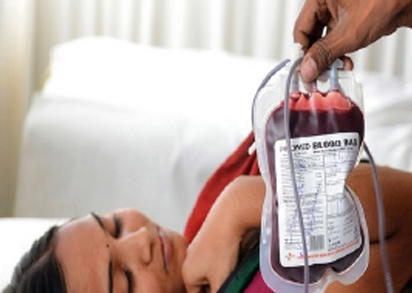By Marie-Therese Nanlong, JOS
Every year on June 14, the world pauses to honour millions of unsung heroes, ordinary men and women who roll up their sleeves to give the most precious gift of all: their blood.
Read Also: Sokoto’s endless season of sorrow: 110 killed in tragic boat mishaps
For them, blood donation is not an obligation but a gesture of love and compassion.
Yet, in Plateau State, myths, misconceptions, and fear still keep many away from this life-saving act.
At the Plateau State Specialist Hospital, PSSH, in Jos, the statistics tell a sobering story. Between June 2024 and June 2025, a total of 808 units of blood were donated. Of these, only 55 units came from voluntary donors, representing barely seven percent of the supply.
The overwhelming majority, 728 units, came from family replacement donors, often distressed relatives compelled to donate blood to secure treatment for their loved ones.
“This dependence on family replacement is not sustainable,” the Chief Medical Director, Professor Chris Yilgwan explained. “When emergencies occur, families may not be available or medically fit to donate, leaving patients stranded.”
The consequences of this reluctance are real and painful. For Grace John, a mother of two from the Jenta Mangoro community, hesitation in finding blood nearly cost her life.
She recalled: “The night I delivered, I began to bleed heavily. The doctors told my family I needed blood urgently, but my blood type was not in stock. My husband ran around pleading for donors until a relative stepped forward. I survived, but it was close. I often wonder what would have happened if no one was there.”
According to PSSH records, the hospital issues an average of 60 units of blood monthly, with peaks reaching 91 units. Yet in some months, December 2024, February 2025, and April 2025, no voluntary donors came forward at all. Without a steady voluntary supply, doctors are left with few options.
Even when blood is secured, not all of it reaches patients. Between June 2024 and June 2025, five units expired and 20 units were lysed, mostly due to power failures that disrupted the cold chain. “Without steady electricity, we risk losing donated blood. The blood bank requires consistent refrigeration, but outages often make this difficult,” an official in the hospital who didn’t want to be named said.
Misconceptions
The reluctance to donate stems not from cruelty but from fear and misinformation. Some Plateau residents cling to beliefs that donation causes weakness, infertility, or even spiritual vulnerability. “Donating blood makes you permanently weak. I don’t also think it is proper to donate blood free but the hospital will ask those in need to pay,” said Jonathan Malan.
Similarly, Favour Ibrahim from Fursum in Jos East admitted: “I believe donating blood would make me spiritually vulnerable. That is why I avoid it.”
These misconceptions thrive where scientific knowledge is scarce and false narratives hold sway. But health workers are calling for a change with facts.
“Blood donation is safe, and it saves lives every single day. One unit of blood can be separated into red cells, platelets, and plasma, saving up to three patients. For the donor, it reduces excess iron levels, lowers the risk of certain heart diseases, and above all, gives fulfilment, knowing that your generosity saved a life,” said Martha Gabriel, a scientist at a private lab in Jos.
Philemon, a senior medical officer at the hospital, reinforced this point: “Voluntary donors are the safest donors. They come without pressure, so they answer screening questions honestly. Their blood is already stored, ready for emergencies.”
Nurse Deborah, who works at a private clinic in Jos, added: “Unlike replacement donations that happen in panic, voluntary donations ensure hospitals are prepared.”
The Plateau Specialist Hospital, in partnership with the National Blood Service Agency, is working to shift public perception. Advocacy visits to schools, churches, mosques, and communities are gradually breaking myths. Health workers patiently answer questions, assuring residents that donation does not sap strength, cut short life, or expose them spiritually.
Still, systemic hurdles like poor funding, inadequate equipment, and unstable electricity hamper storage and supply. “Even the best facilities mean nothing if there is no blood to store,” a hospital staff member admitted.
‘Why I feel stronger after donating blood’
Despite the obstacles, some Plateau citizens have embraced the call. James Terseer, a 28-year-old civil servant, donates blood regularly.
“At first, I was scared like everyone else,” he said. “But after my cousin died because blood was not available during surgery, I made up my mind. Each time I donate, I feel stronger, not weaker. And I know I’m helping someone somewhere.”
His story emphasizes a truth that health officials want every citizen to understand that blood donation is not about loss but about giving hope.
As hospitals continue to appeal for voluntary blood donation, the call for Plateau residents is louder than ever. Blood is needed daily, for accident victims, women in labour, patients with sickle cell anaemia, and countless others.
Blood donation does not drain vitality or shorten life. It saves mothers, like Grace mentioned earlier from tragedy, spares families from despair, and strengthens hospitals in times of crisi
For every healthy adult aged 18 to 65, the opportunity to save lives lies within reach, every few months. The challenge is about overcoming fear.
Each pint donated means a second chance for someone else. In the end, the greatest gift Plateau citizens can offer may be the simplest, a sleeve rolled up, a needle in the arm, and the gift of life flowing to another.
The post Myths, Misconceptions, Reluctance: Why Plateau citizens must embrace voluntary blood donation appeared first on Vanguard News.

